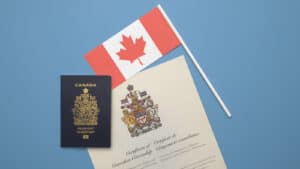The Guidelines for Inadmissibilities for Which the Applicant Has Not Requested an Exemption
The officers could encounter situations where the applicant does not specifically request for any exemptions. In this scenario, the decision makers could contemplate refusing the application. Or, they could use their authority for providing exemptions on their own initiative. They could provide these exemptions on their own initiative at any time during the assessment of the application. This is in accordance with the provisions specified in A25.1 (1).
Such situations could typically involve:
-
Applicants who do not meet the requirements of the Act or the Regulations or,
-
New or existing inadmissibilities that arise after a positive Stage 1 Humanitarian and Compassionate (H&C) assessment, but prior to the authorities granting permanent residence to the applicant
For instance, consider a situation where a member of the applicant’s family becomes inadmissible. In some cases, the officers might believe that the inadmissibility is not significant enough for outweighing a positive assessment. In this scenario, the officers have the authority to exercise their discretion. Thus, they can grant an exemption. Alternatively, they could refer the case to a delegated decision maker as well. They would do this especially in cases where they feel that various Humanitarian and Compassionate (H&C) considerations justify the granting of the exemption.
Similarly, situations could arise where the applicant does not directly request an exemption. Nonetheless, the officers might find that certain facts in the application indicate that the applicant is requesting an exemption for the inadmissibility. In this scenario, the officers would need to treat the application as if the applicant has requested for the exemption.
For instance, the officers might come across cases where the applicant has a criminal conviction. In many cases, such applicants typically make cases as to why they should receive exemptions from these inadmissibilities in their submissions. Such applicants could cite reasons such as those given below to highlight why they merit the provision of the exemptions:
-
The applicants might have served their time
-
The applicants might have done community service or,
-
The applicants might have full-time employment
These are perfect examples of cases where applicants seek exemptions for inadmissibilities without explicitly asking for it.
In these situations, it is worth highlighting that the onus rests on the applicant to make their case. In addition, it is the applicant who bears the burden of proving any claim upon which the applicant is relying (Owusu v. MCI, 2004 FCA 38).
The authorities have placed the entire onus upon the applicant to be clear in the submission as to exactly what kind of hardships the applicants would face if the authorities did not grant them the requested exemptions. As such, officers would not need to:
-
Elicit information on various humanitarian and compassionate (H&C) factors and,
-
Satisfy applicants that such grounds do not exist
However, applicants would need to put forward any humanitarian and compassionate (H&C) factors that they believe are relevant to their cases.
Note:
-
This specification applies to applications made in Canada and overseas
In some cases, the officers might consider granting an exemption in the absence of any specific request from the applicant. In this scenario, the officers would need to inform the applicants that the officers are considering various Humanitarian and Compassionate (H&C) considerations. In addition, the officers would need to give the applicants the opportunity for presenting their own reasons for Humanitarian and Compassionate (H&C) consideration.
Situations could arise where the applicants provide updated or additional submissions. In some of these submissions, the officers might find that the applicants have requested for exemptions on Humanitarian and Compassionate (H&C) grounds from the new or newly discovered inadmissibility. In these situations, the officers would need to consider these requests.
In the overseas context, the officers would need to be mindful that the processing fees might not be applicable in some cases. This is especially so in cases involving refugee applications. As such, if the officers decide to use the Minister’s initiative, they would need to ensure that they do not levy any processing fees for the Humanitarian and Compassionate (H&C) consideration.
The Guidelines for Cases with Extrinsic Information Suggesting Inadmissibility
Officers will typically receive information about the applicant in two modes. These comprise:
-
Intrinsic information (or information that comes from the applicant) or,
-
Extrinsic information (or information that comes from various other sources [refer to Appendix C]
Situations could arise where the officers find that the decision could be negative because of information obtained from people other than the applicant. In this scenario, procedural fairness demands that the officers inform the applicant about this. Doing so would enable the applicant to have an opportunity for responding before the authorities make a decision.
Officers would need to share extrinsic information with the applicant. This would enable the applicants to make submissions on the extrinsic information prior to the authorities using this information for making the decision.
Family members who are in Canada could become permanent residents concurrently with a principal applicant in Canada. However, the officers would not be able to process family members who are outside Canada for permanent resident visas concurrently with the principal applicant in Canada. However, the officers have the ability to process these family members as members of the family class supported by a sponsorship. But, it is worth highlighting that the officers would only be able to do this once the applicant becomes a permanent resident.
The Statutory Requirements
-
The Background Verifications – Criminal and Security Checks
-
The Canadian Security Intelligence Service (CSIS) is responsible for performing the security screening
-
Similarly, the Royal Canadian Mounted Police (RCMP) is responsible for conducting the screening for criminal records on behalf of Citizenship and Immigration Canada (CIC)
-
Officers would need to request security screening from the Canadian Security Intelligence Service (CSIS) via the Global Case Management System (GCMS)
-
As such, officers would need to instruct the applicants to obtain police certificates for the countries in which they spent more than six months after attaining 18 years of age
-
For family members abroad, the appropriate visa office would need to initiate the background verifications for the applicant’s family members abroad
-
For more details on this, officers would need to refer to Section 13 of OP 24 titled ‘Family Members of Humanitarian and Compassionate (H&C) Applicants in Canada’
-
-
The Medical Examination
-
The officers would need to issue the relevant instructions for the medical examination to the applicant and the dependent family members
-
The authorities typically consider the medical officer’s opinions as extrinsic information
-
As such, if the officers find an applicant or any family member to be medically inadmissible, they would need to inform the applicant and provide them with the opportunity to make the appropriate submissions
-
-
The Results of Statutory Requirements (which are valid as follows)
-
For criminal checks
-
It is worth highlighting that criminal checks typically have no specific validity date
-
As such, the officers would need to refer to the National Case Management System (NCMS) or the Field Operations Support System (FOSS) for any information about recent charges or convictions
-
In case one year has elapsed from the time of the criminal check (or whenever the situation warrants it), officers would need to carry out a new Canadian Police Information Centre (CPIC) check
-
-
Security checks
-
The results of security checks remain valid for 48 months
-
In some cases, it is possible that the results might have expired
-
In this scenario, the officers would need to submit a new request for screening to the Canadian Security Intelligence Service (CSIS) through the Global Case Management System (GCMS)
-
-
Medical checks
-
Medical results typically remain valid for 12 months from the date of the medical assessment
-
For more information on this, officers would need to refer to the following sections on the website of Citizenship and Immigration Canada (CIC):
-
The validity of a medical certificate and,
-
The reassessments for a new medical certificate
-
-
-
-
The Waiver of Passport Requirement
-
It is worth highlighting that all foreign nationals would need to possess a document described in the provisions specified in R50 (1) e.g. passports or other acceptable identity documents
-
This requirement applies to all foreign nationals except for protected persons
-
Only then would these foreign nationals be able to become permanent residents – based on the provisions specified in R72 (1) (e) (ii)
-
Situations could arise where applicants might not have valid passports
-
In this scenario, the officers have the ability to consider waiving the passport requirement on Humanitarian and Compassionate (H&C) grounds
-
However, the officers would only do this once they are completely satisfied about the identity of the applicants
-
Certain situations are perfectly appropriate for officers to grant a waiver of the requirement for passports
-
These situations include, but are not limited to occasions when:
-
The Canada Border Services Agency (CBSA) has seized the passport of the applicant and the officers can find no mention in the file or in the Field Operations Support System that the applicant’s identity is a concern
-
The applicant has provided other identity documents that are sufficient for establishing the individual’s identity and,
-
The applicant had a valid passport that has since expired
-
-
Once the authorities grant the exemption from the passport requirement, the officers would need to insert certain remarks in the Global Case Management System (GCMS)
-
In addition, the officers would need to send a letter to the applicant that contain the following statement ‘I grant an exemption from subparagraph 72(1)(e)(ii) of the Immigration and Refugee Protection Regulations for [name of person(s)].’
-
It is worth highlighting that the Canada Border Services Agency (CBSA) seized the passports or travel documents of certain individuals
-
For more details on this, officers would need to go through OB 553
-
The Guidelines for Cases Involving Referrals to Delegated Decision Makers – The Procedures for Officers
Officers would need to send cases to a delegated decision maker when both of the following conditions apply:
-
The officers do not have the delegated authority for granting a requested exemption and,
-
The officers believe that various Humanitarian and Compassionate (H&C) factors might justify an exemption (refer to Appendix D)
When the officers refer a case to a delegated decision maker, they would need to take the following steps:
-
Step 1 – Ensure that the applicant is inadmissible under the provisions specified in A34, A35 and A37 (refer to Appendix A) (also refer to the section titled ‘The Guidelines for A34, A35 or A37 Cases – When the Authorities Received the Applications Prior to June 19, 2013’)
-
In addition, they would need to ensure that the authorities received the application prior to June 19, 2013 – in accordance with the provisions specified in A36 (1) or A38 (refer to the section titled ‘The Guidelines for A36 (1) and A38 Cases’)
-
-
Step 2 – If extrinsic information exists that requires procedural fairness, the officers would need to:
-
Send a letter to the applicant informing them of the suspected inadmissibility
-
Disclose any extrinsic evidence that they might have
-
Provide the applicant with an opportunity to make submissions to include with the information for the delegated decision maker
-
Thereafter, the officers would need to review the response from the client to ensure that the applicant continues to be inadmissible, following which they would send the package to the delegated decision maker
-
-
Step 3 – Prepare a package that contains copies of all the relevant documents for Humanitarian and Compassionate (H&C) decision making, which would typically include:
-
A copy of the entire Humanitarian and Compassionate (H&C) case file (including any submissions pertaining to the case)
-
A brief factual case summary
-
Officers would not need to make any recommendation
-
Instead, they would need to include details such as whether the applicant has applied for Ministerial Relief
-
-
Any correspondence between Citizenship and Immigration Canada (CIC) and the applicant (this would also include any notes from interviews with the applicant)
-
Submissions from the applicant following a procedural fairness letter
-
For cases that involve health inadmissibilities:
-
A medical notification
-
The results of consultations with the provincial or territorial health authorities, when the province or territory requires it
-
Detailed information about the medical condition and the associated costs (the Health Management Branch would usually be able to provide this)
-
For cases involving A38 (1) (c) – refer to Appendix E, the officer’s assessment is imperative
-
-
In case the applicant states that treatment is not available in their country of origin and information exists that indicates the contrary, the officers would need to disclose this information to the applicant and include it as well
-
-
A conviction certificate and any police or intelligence report (along with the results from fingerprint searches and overseas criminality checks)
-
Any other relevant documents in the file and,
-
If any new information becomes available after the officers refer the package to the delegated decision maker, the officers would need to send this new information as well
-
-
Step 4 – Include any extrinsic evidence and specify whether the officers have disclosed this to the applicant
-
Step 5 – Specify in the appropriate system the date on which the officers sent the application to the delegated decision maker
-
Step 6 – Receive the decision from the delegated decision maker
-
Step 7 – Enter the decision in the Global Case Management System (GCMS) or the Field Operations Support System (FOSS) using the following remarks:
-
In case the authorities have granted the exemption: “An exemption is granted from the inadmissibility under [provide section or subsection] of IRPA for [name of applicant]”
-
In case the authorities do not grant the exemption: “An exemption is not granted from the inadmissibility under [provide section or subsection] of IRPA for [name of applicant]”
-
-
Step 8 – Send a letter notifying the applicant of the decision maker’s decision
-
Step 9 – Finalise the processing of the case by:
-
Commencing Stage 2 processing of the application once the authorities grant the exemption
-
Forwarding the request from the Federal Court for a Rule 9 or a Rule 17 (to the decision maker along with the actual refusal letter sent to the client) in case the authorities do not grant the exemption and the applicant makes an application for leave and judicial review or,
-
Preparing the record at the office where the authorities made the decision
-






